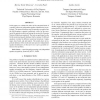Free Online Productivity Tools
i2Speak
i2Symbol
i2OCR
iTex2Img
iWeb2Print
iWeb2Shot
i2Type
iPdf2Split
iPdf2Merge
i2Bopomofo
i2Arabic
i2Style
i2Image
i2PDF
iLatex2Rtf
Sci2ools
95
Voted
ICASSP
2011
IEEE
2011
IEEE
A study of the effect of emotional state upon text-independent speaker identification
In this paper we evaluate the effect of the emotional state of a speaker when text-independent speaker identification is performed. The spectral features used for speaker recognition are the Mel-frequency cepstral coefficients, while for the training of the speaker models and testing the system the Gaussian Mixture Models are employed. The tests are performed on the Berlin emotional speech database which contains 10 different speakers recorded in different emotional situations: happy, angry, fear, bored, sad and neutral. The results show an important influence of the emotional state upon text-independent speaker identification. In the end we try to give a possible solution to this problem.
Emotional State | ICASSP 2011 | Mel-frequency Cepstral Coefficients | Signal Processing | Text-independent Speaker Identification |
| Added | 20 Aug 2011 |
| Updated | 20 Aug 2011 |
| Type | Journal |
| Year | 2011 |
| Where | ICASSP |
| Authors | Marius Vasile Ghiurcau, Corneliu Rusu, Jaakko Astola |
Comments (0)

